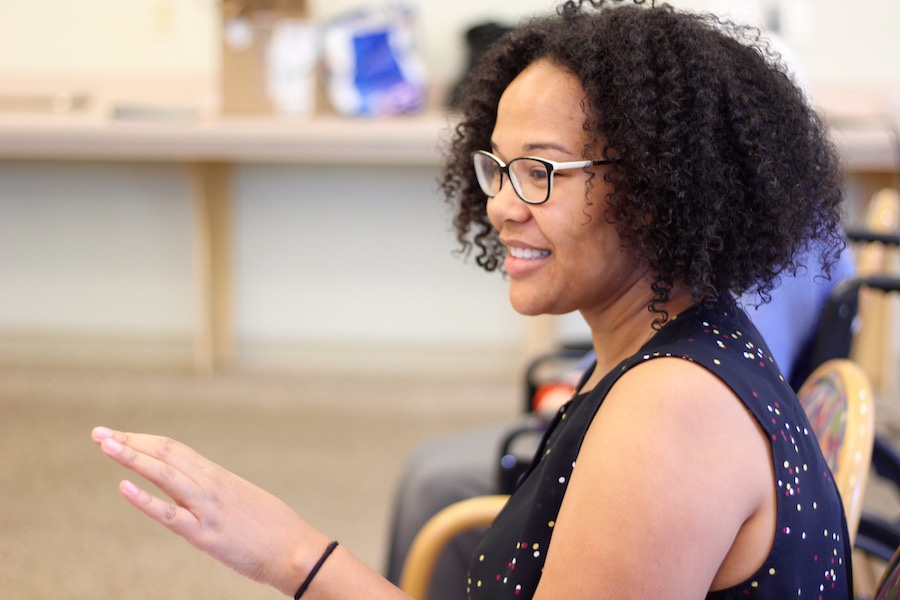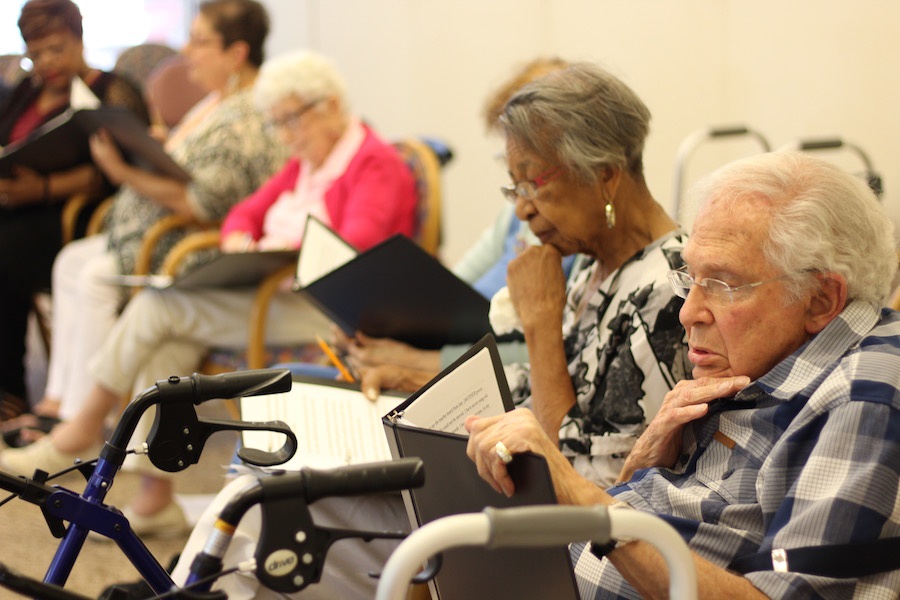
ElderPlay Project | Arts & Culture | New Haven | Theater
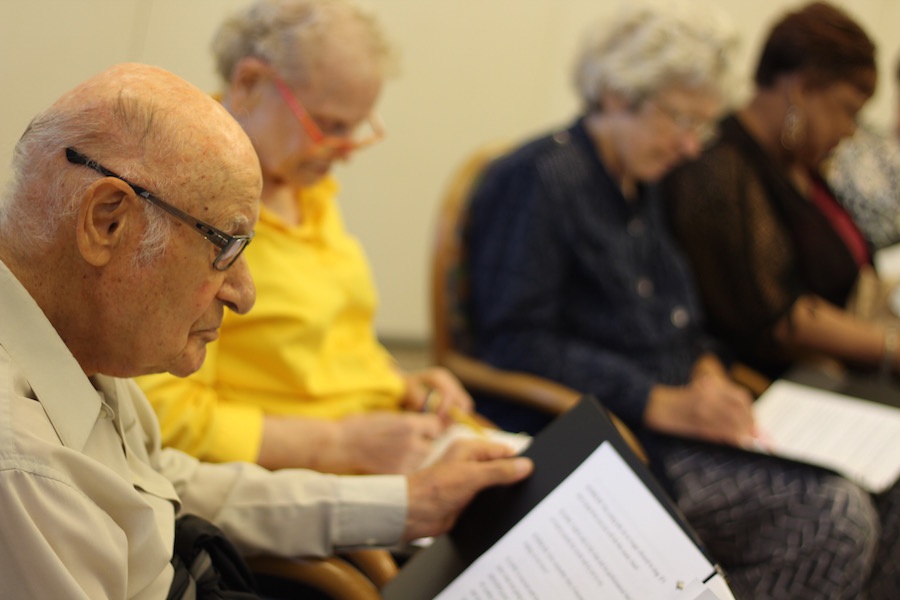
| Lucy Gellman Photos. |
Nancy Rose was running her lines for the hundredth time when she stopped abruptly. She had just described Kevin, a “tender lover” whose skill in and outside of the bedroom had won her over. But on the words “he took classes by day,” she stopped and looked up at the cast. Someone rummaged for silverware one room over; a water glass landed on a table with a clink.
“No, actually,” she said aloud, correcting the script. “He took drugs by day.” A beat, and cast members erupted in laughter.
Rose (pictured below with Candis Green) is part of the eighth annual Elder Play Project, a collaboration between Long Wharf Theatre and Tower One Tower East assisted living facility. This Sunday, the work comes to Long Wharf’s main stage theater for a single showing at 5 p.m. An encore will follow in September at Tower One Tower East. Both performances are free and open to the public; more information here.
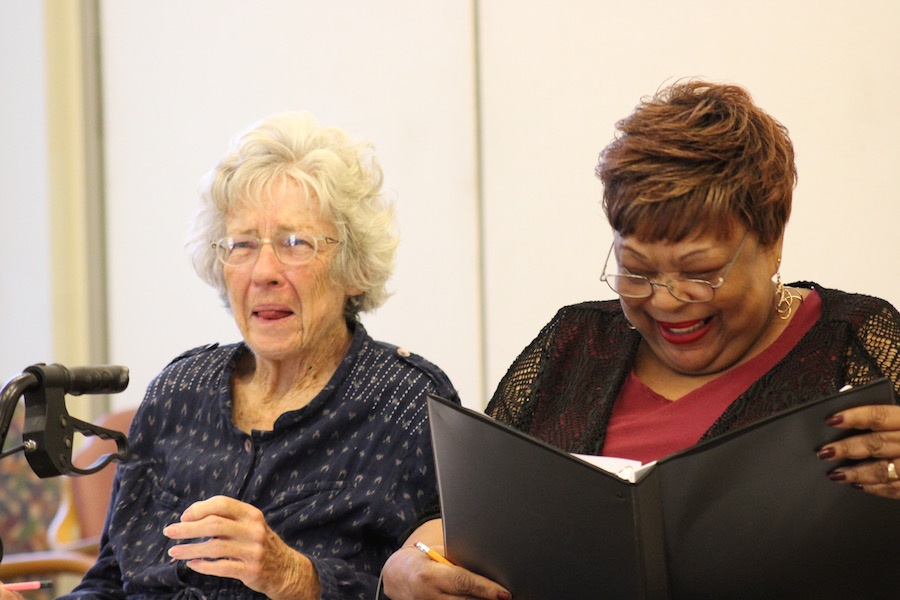
Elder Play began last fall, as Long Wharf kicked off its season with Small Mouth Sounds in September. As those actors prepared for their work on the main stage, Long Wharf Community Engagement Associate Aurelia Clunie assembled the Elder cast, a group of 14 seniors-turned-playwrights and actors (it has since shrunk to 12). With Clunie and Community Engagement Manager Elizabeth Nearing, the group met before Small Mouth Sounds to discuss the play, saw a Sunday performance, and then gathered again afterwards to brainstorm, write, and discuss how each show related to their own lives. They repeated that six times in total, for all six shows of the season.
The themes morphed with each brainstorm, from the retreat and quietude of Small Mouth Sounds to the chilling isolation of Office Hour to what it meant, after Baskerville, to embody another character with one’s body and voice. After Regina Taylor’s reimagined Crowns this spring, many Elder Play members recalled visiting grandparents all over the Northeast and American South, from the Carolinas to Hartford to Brooklyn. So too after a revised The Chosen in December, as several cast members unspooled childhoods soaked in Yiddish, or spent in the bright, awe-inspiring innards of New Haven’s midcentury synagogues.
“Everyone has amazing ownership [of the project] … it really is their work,” Clunie said after the group’s final rehearsal at Tower One Tower East Tuesday afternoon.
And indeed, Elder Play 2018 is wise and honest without ever feeling old and out-of-touch. As Stanley Saxe sings out “Thanks for the memories,” his eyes glinting and fixed on the audience, something clicks into motion: the Elder Play express is leaving the station, and you had better get on board. We are transported to a realm far beyond ourselves, where we stand to learn a very great deal in just over 60 minutes.
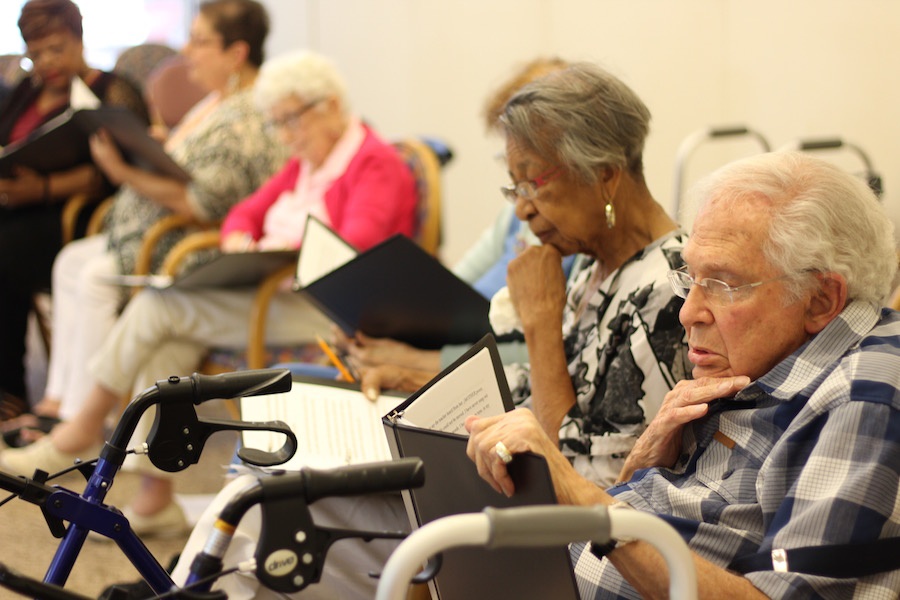
In part, it’s a ride through the past that doubles as a lesson for the present. No sooner has a cast member suggested that “life is a variety of storms” that they come in unexpected swells. From Saxe, who belts his childhood memories—the iceman in the kitchen, horses on the streets, a trolley that doesn’t run anymore, services at Beth El Keser Israel (BEKI)—in joyous succession. From Sylvia Rifkin, who speaks of finding a friend that was “one of the wisest people I’ve ever known” only to lose her later in life to death. From Carole “Corky” Weinstein, who recalls feeling like a stranger in her own home, told that she should be thinking about having children while her brothers prepared for college.
These are struggles that don’t feel so historically distant or dust-covered. As they mourn their parents and grandparents, we miss ours too: the day and road trips around their home cities and ours, holidays with warm, heaping plates of food no matter the religious or cultural background. At Tuesday’s rehearsal, participant Candis Green recalled wanting to rush the stage and give Yolanda a hug after her spiritual homecoming in Crowns.
Ernie Bodenweber spoke on how much he had learned from his own daughter when she was in high school, and challenged him on doubting a teacher on the basis of his sexual orientation. Terry Berger spun memories of her Russian grandmother, and I could see my grandparents at their breakfast table, the smell of fried pastrami still cutting the air, as they switched into Yiddish because they thought one of the kids was listening.
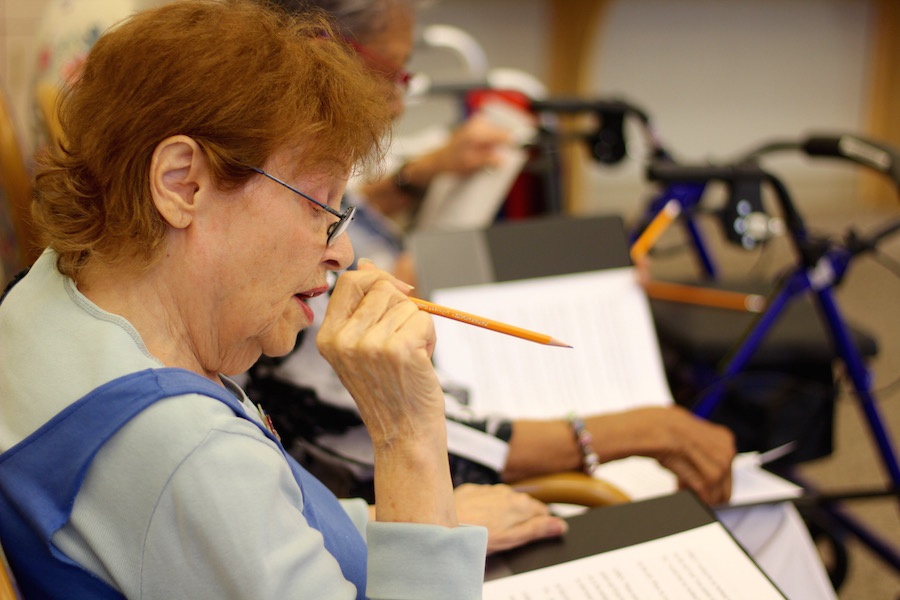
There’s a cantorial, ritualistic quality there, carried in no small part by Saxe’s use of song to deliver his lines. It transfers to speech: in a strong, lilting alto with a hint of Bernie Sanders’ Brooklyn, Berger recalls taking the train alone to Vassar College, a typewriter in her suitcase and trunk of Lord & Taylor skirts and sweaters awaiting her in Poughkeepsie. What a surprise, when she arrived to find a campus of mothers and daughters dressed in Bermuda shorts and knee socks, shopping for furnishings that didn’t come with the rooms. Berger, not for the first time in her life, was alone.
“I felt like I had landed at the bottom of the sea,” she recalls, and we too are back in the depths of our own isolation, rooting for her because we are also rooting for ourselves.
That’s true for Weinstein, as she describes pursuing a two-year degree that allowed her to become a medical assistant, only to face doubt and discrimination when she suggested a patient was sick, or offered a diagnosis. Or for Elaine Feldman, whose small bucket list with her husband never happened, because he was taken from this world too soon. Or Rifkin, who recalls a three-night romance on vacation that changed her life. This work is a love story, and a prayer, and a padlocked box of memories all rolled into one, gleaming from the stage.
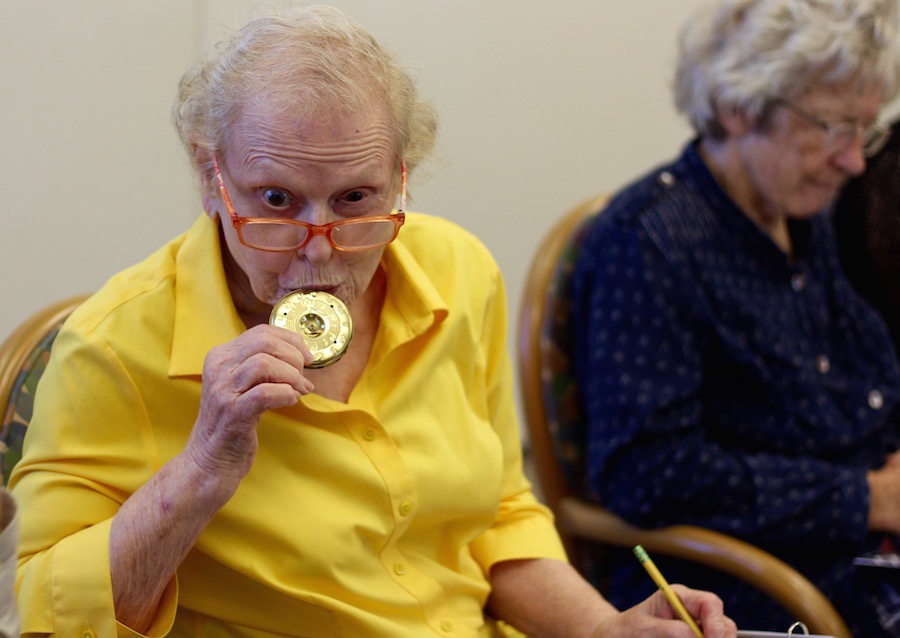
But Elder Play is also a reminder that we, in the dark of the audience, also cannot sit idly by and watch history repeat itself. While Rose is all passion and humor with the story of Kevin, who could bring her to 10 orgasms in a single night, she is also candid with stories of her own family, starting with a mother who became pregnant seven times, and gave birth to five daughters and two stillborn sons because her father willed away use of her diaphragm. Who was so worn down that she would drink at the end of each workday, and fall into a deep sleep in her room. Decades removed and in a state where Roe v. Wade is still enshrined in the constitution, it still feels timely—that your body is not really your own until everyone around you believes that it is.
The only way out, the work seems to suggest, is to let love triumph. As Elder Play’s world spins from eduction to work, from New York to New Haven, cast members recall the great loves that have changed life trajectories, transformed vacations, and ended on stormy seas or with death’s final blow. From each, we pick up the same message: that we should be lucky enough to lead this blessed, messy thing called life to its fullest. And, maybe, pick up our smartphones a little less often, and only to call our loved ones.
As she delivered final notes Tuesday afternoon, Clunie praised the group for its parting line, another “thanks for the memories” delivered this time in unison. Cast members weren’t sure about it yet, they protested. Clunie shook her head.
“Trust it,” she said. “It does not sound like a little kid’s recital. It sounds like a Greek chorus.”
